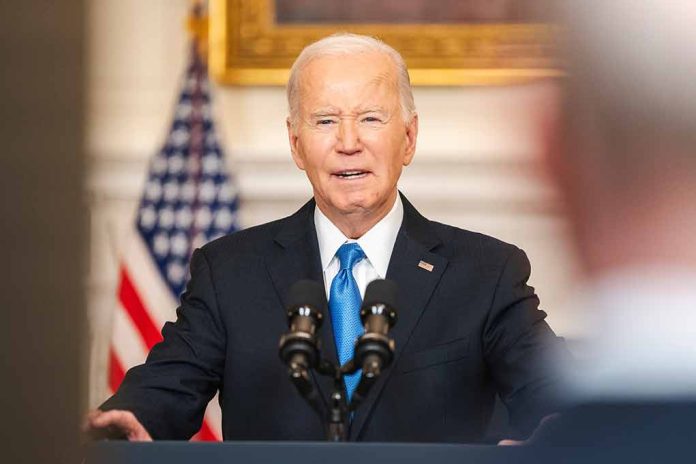
President Biden announces a $7.3 billion clean energy investment for rural America, sparking debate over spending amid record national debt.
At a Glance
- Biden pledges $7.3 billion for clean energy projects in rural areas across 23 states.
- Investment aims to benefit 5 million rural households and create thousands of jobs.
- Critics question the spending as national debt surpasses $35 trillion.
- Initiative is part of the Inflation Reduction Act and Investing in America agenda.
Biden’s Clean Energy Push Amidst Debt Concerns
President Joe Biden visited Wisconsin to announce a substantial $7.3 billion investment in clean energy projects for rural America. This initiative, part of the Empowering Rural America (New ERA) program, aims to modernize rural electric cooperatives and expand clean energy infrastructure. The funding, derived from the Inflation Reduction Act, represents the largest investment in rural electrification since the 1936 Rural Electrification Act.
The announcement comes at a time when the national debt has reached a historic high of over $35 trillion, raising questions about the wisdom of such significant spending. The Biden administration defends the investment as crucial for rural development, job creation, and combating climate change.
Impact on Rural Communities
The clean energy initiative is expected to benefit approximately 5 million rural households across 23 states. The 16 selected projects will leverage over $29 billion in private investments to build more than 10 gigawatts of clean energy capacity. This includes 3,723 megawatts of wind, 4,733 megawatts of solar, 804 megawatts of nuclear, and 357 megawatts of hydropower.
“It’s an exciting announcement with a massive impact across 23 states to bring the promise of clean energy and lower costs to approximately 5 million rural households, representing 20% of the nation’s entire rural household, as well as farms and businesses that are located in those 23 states,” Agriculture Secretary Tom Vilsack told reporters on a call Wednesday previewing the announcement.
The administration claims these projects will reduce and avoid at least 43.7 million tons of greenhouse gases annually. Additionally, the initiative is projected to create 4,500 permanent jobs and 16,000 construction jobs, potentially boosting local economies.
Dairyland Power Cooperative: A Case Study
Dairyland Power Cooperative in Wisconsin will receive the first New ERA award of nearly $573 million. This cooperative plans to procure 1,080 megawatts of renewable energy through various wind and solar projects. The White House asserts that electric rates for Dairyland members will be 42% lower over 10 years due to the New ERA funding.
“Under the Biden-Harris Administration, we are supporting a more prosperous future for rural communities by speeding up the transition to clean energy while at the same time keeping monthly bills low and investing in the American workforce with new jobs and apprenticeships,” said Secretary Vilsack.
The total cost of the Dairyland project will exceed $2 billion, showcasing the significant scale of these investments. Dairyland Cooperative will also invest in community benefit plans to assist farmers and connect to employment opportunities, further integrating the project into the local community.
Balancing Clean Energy and Fiscal Responsibility
While the Biden administration touts the benefits of this clean energy initiative, critics argue that such substantial spending is irresponsible given the current national debt levels. The debate highlights the ongoing challenge of balancing environmental goals with fiscal responsibility.
Supporters of the initiative argue that investments in clean energy are necessary to combat climate change and secure America’s energy future. They also point to the potential for job creation and economic growth in rural areas. However, fiscal conservatives warn that continued high levels of government spending could lead to long-term economic consequences.
As the 2024 election approaches, the clean energy investment is likely to remain a contentious issue, with voters weighing the potential benefits against concerns about government spending and debt.
Sources:
- Biden pledges $7.3B in ‘clean energy’ spending with national debt at $35T
- Biden-Harris Administration Announces $7.3 Billion in Clean Energy Investments from the Investing in America Agenda, Largest Investment in Rural Electrification Since the New Deal
- FACT SHEET: President Biden Visits Westby, Wisconsin, Announces $7.3 Billion for Clean, Affordable, Reliable Electricity for Rural America; The Largest Investment in Rural Electrification Since the New Deal
- Biden pledges $7.3B in ‘clean energy’ spending with national debt at $35T






















